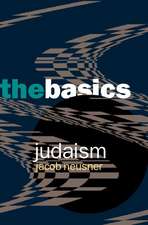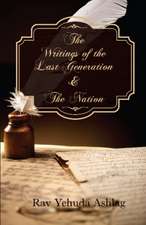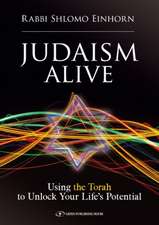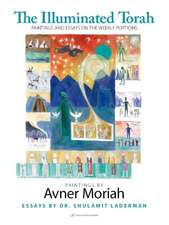Judaism and Christianity in the Age of Constantine: History, Messiah, Israel, and the Initial Confrontation: Chicago Studies in the History of Judaism
Autor Jacob Neusneren Limba Engleză Paperback – 6 mar 2008
With the conversion of Constantine in 312, Christianity began a period of political and cultural dominance that it would enjoy until the twentieth century. Jacob Neusner contradicts the prevailing view that following Christianity's ascendancy, Judaism continued to evolve in isolation. He argues that because of the political need to defend its claims to religious authenticity, Judaism was forced to review itself in the context of a triumphant Christianity. The definition of issues long discussed in Judaism—the meaning of history, the coming of the Messiah, and the political identity of Israel—became of immediate and urgent concern to both parties. What emerged was a polemical dialogue between Christian and Jewish teachers that was unprecedented.
In a close analysis of texts by the Christian theologians Eusebius, Aphrahat, and Chrysostom on one hand, and of the central Jewish works the Talmud of the Land of Israel, the Genesis Rabbah, and the Leviticus Rabbah on the other, Neusner finds that both religious groups turned to the same corpus of Hebrew scripture to examine the same fundamental issues. Eusebius and Genesis Rabbah both address the issue of history, Chrysostom and the Talmud the issue of the Messiah, and Aphrahat and Leviticus Rabbah the issue of Israel. As Neusner demonstrates, the conclusions drawn shaped the dialogue between the two religions for the rest of their shared history in the West.
In a close analysis of texts by the Christian theologians Eusebius, Aphrahat, and Chrysostom on one hand, and of the central Jewish works the Talmud of the Land of Israel, the Genesis Rabbah, and the Leviticus Rabbah on the other, Neusner finds that both religious groups turned to the same corpus of Hebrew scripture to examine the same fundamental issues. Eusebius and Genesis Rabbah both address the issue of history, Chrysostom and the Talmud the issue of the Messiah, and Aphrahat and Leviticus Rabbah the issue of Israel. As Neusner demonstrates, the conclusions drawn shaped the dialogue between the two religions for the rest of their shared history in the West.
Din seria Chicago Studies in the History of Judaism
-
 Preț: 215.51 lei
Preț: 215.51 lei -
 Preț: 321.18 lei
Preț: 321.18 lei -
 Preț: 293.81 lei
Preț: 293.81 lei -
 Preț: 263.53 lei
Preț: 263.53 lei -
 Preț: 261.66 lei
Preț: 261.66 lei -
 Preț: 291.90 lei
Preț: 291.90 lei -
 Preț: 312.70 lei
Preț: 312.70 lei -
 Preț: 294.96 lei
Preț: 294.96 lei -
 Preț: 288.42 lei
Preț: 288.42 lei -
 Preț: 284.56 lei
Preț: 284.56 lei -
 Preț: 293.04 lei
Preț: 293.04 lei -
 Preț: 231.56 lei
Preț: 231.56 lei -
 Preț: 263.57 lei
Preț: 263.57 lei -
 Preț: 320.80 lei
Preț: 320.80 lei -
 Preț: 248.05 lei
Preț: 248.05 lei - 20%
 Preț: 160.30 lei
Preț: 160.30 lei - 22%
 Preț: 522.75 lei
Preț: 522.75 lei - 12%
 Preț: 310.42 lei
Preț: 310.42 lei - 16%
 Preț: 261.16 lei
Preț: 261.16 lei
Preț: 315.58 lei
Nou
Puncte Express: 473
Preț estimativ în valută:
60.38€ • 63.22$ • 49.97£
60.38€ • 63.22$ • 49.97£
Carte tipărită la comandă
Livrare economică 07-21 aprilie
Preluare comenzi: 021 569.72.76
Specificații
ISBN-13: 9780226576534
ISBN-10: 0226576531
Pagini: 262
Dimensiuni: 152 x 229 x 18 mm
Greutate: 0.36 kg
Editura: University of Chicago Press
Colecția University of Chicago Press
Seria Chicago Studies in the History of Judaism
ISBN-10: 0226576531
Pagini: 262
Dimensiuni: 152 x 229 x 18 mm
Greutate: 0.36 kg
Editura: University of Chicago Press
Colecția University of Chicago Press
Seria Chicago Studies in the History of Judaism
Notă biografică
Jacob Neusner is University Professor and Ungerleider Distinguished Scholar of Judaic Studies at Brown University. He is the author of many scholarly works including Judaism and Scripture: The Evidence of the Leviticus Rabbah and Jusaism: The Classical Statement: The Evidence of the Bavli, both published by the University of Chicago Press.
Cuprins
Preface
Acknowledgments
Introduction
Religion and Political Change
Judaism without Christianity
The Judaic Sages' Canon in the Context of the Fourth Century
Their Intent, Our Interpretation
1. Judaism and Christianity in the Age of Constantine
Christianity and the Roman Empire in the Age of Constantine
Jews in the Land of Israel in the Fourth Century
Judaism in the Land of Israel
2. Genesis Rabbah and Israel's History: Christian and Judaic Theories of History and Its Meaning
The Issue of History: Events, Patterns, Proofs
Eusebius and the Beginnings of Christian Historiography
Genesis Rabbah and Israel's Historical Crisis
3. The Talmud of the Land of Israel and the Messiah: Christian Triumph, Judaic Response
The Messianic Crisis
Chrysostom: Jewish Unbelief, Christian Wavering
The Talmud of the Land of Israel and Israel's Messianic Crisis
4. Leviticus Rabbah, Genesis Rabbah, and the Identification of Israel
Who Is Israel?
Aphrahat and the People Which Is No Peoples
Leviticus Rabbah and Israel's National Crisis
Genesis Rabbah: The Claim of the Siblings
Genealogy and the Political Crisis
5. Politics and Proof-Texts: Exegesis and Canon
A Test of Falsification
Same Topic, Different Program: No Encounter
Jerome and the Christian Exegetical Tradition
Sifré to Numbers and the Judaic Exegetical Tradition
The Christian Canon in the Fourth Century: Old and New Testaments
The Judaic Canon in the Fourth Century: The Written and Oral Torah
The Absence of Confrontation
Epilogue: The Shape of the Initial Encounter and the Enduring Confrontation
Sages' Success in the Initial Encounter
The Enduring Confrontation
Appendixes
1. Genesis Rabbah on Israel's History
2. Aphrahat on Israel
3. Leviticus Rabbah on Israel
4. Genesis Rabbah on Israel
Bibliography
Index
Acknowledgments
Introduction
Religion and Political Change
Judaism without Christianity
The Judaic Sages' Canon in the Context of the Fourth Century
Their Intent, Our Interpretation
1. Judaism and Christianity in the Age of Constantine
Christianity and the Roman Empire in the Age of Constantine
Jews in the Land of Israel in the Fourth Century
Judaism in the Land of Israel
2. Genesis Rabbah and Israel's History: Christian and Judaic Theories of History and Its Meaning
The Issue of History: Events, Patterns, Proofs
Eusebius and the Beginnings of Christian Historiography
Genesis Rabbah and Israel's Historical Crisis
3. The Talmud of the Land of Israel and the Messiah: Christian Triumph, Judaic Response
The Messianic Crisis
Chrysostom: Jewish Unbelief, Christian Wavering
The Talmud of the Land of Israel and Israel's Messianic Crisis
4. Leviticus Rabbah, Genesis Rabbah, and the Identification of Israel
Who Is Israel?
Aphrahat and the People Which Is No Peoples
Leviticus Rabbah and Israel's National Crisis
Genesis Rabbah: The Claim of the Siblings
Genealogy and the Political Crisis
5. Politics and Proof-Texts: Exegesis and Canon
A Test of Falsification
Same Topic, Different Program: No Encounter
Jerome and the Christian Exegetical Tradition
Sifré to Numbers and the Judaic Exegetical Tradition
The Christian Canon in the Fourth Century: Old and New Testaments
The Judaic Canon in the Fourth Century: The Written and Oral Torah
The Absence of Confrontation
Epilogue: The Shape of the Initial Encounter and the Enduring Confrontation
Sages' Success in the Initial Encounter
The Enduring Confrontation
Appendixes
1. Genesis Rabbah on Israel's History
2. Aphrahat on Israel
3. Leviticus Rabbah on Israel
4. Genesis Rabbah on Israel
Bibliography
Index










